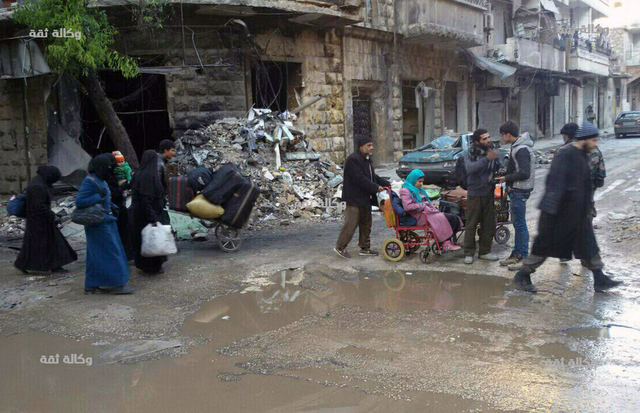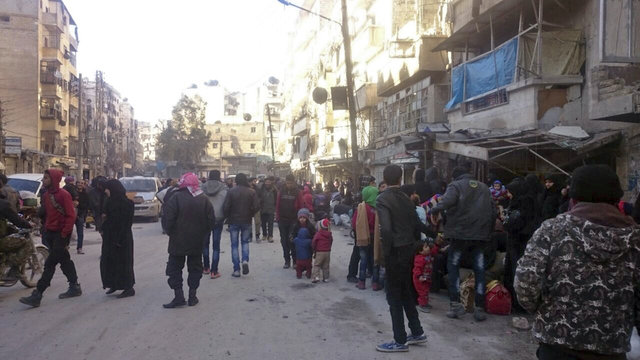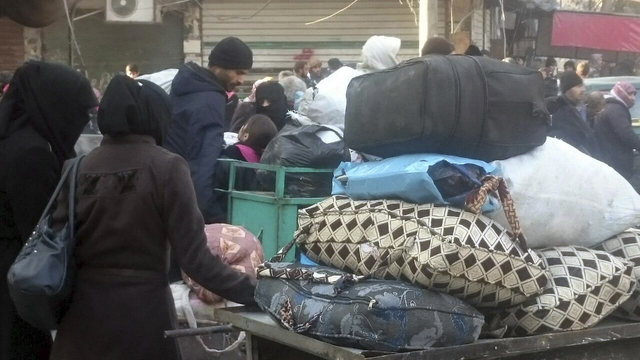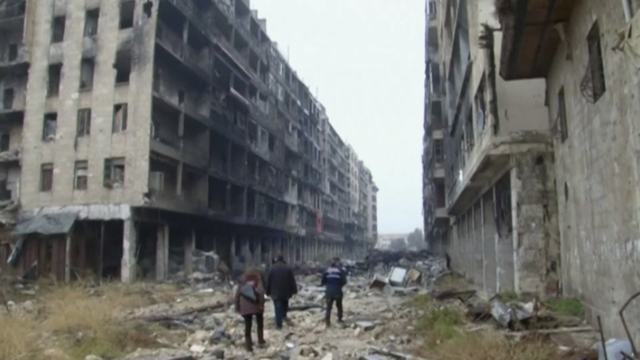BEIRUT — A convoy of ambulances carrying the first group of wounded and other civilians began leaving eastern Aleppo on Thursday, marking the start of the long-awaited pullout from the last rebel enclave in the embattled Syrian city. ADVERTISING BEIRUT
BEIRUT — A convoy of ambulances carrying the first group of wounded and other civilians began leaving eastern Aleppo on Thursday, marking the start of the long-awaited pullout from the last rebel enclave in the embattled Syrian city.
Syrian TV showed live footage of a long convoy of ambulances and green buses driving out and crossing the Ramouseh bridge, en route through government territory and into a rural, rebel-held part of Aleppo province.
The evacuation is part of a cease-fire deal reached this week to have the opposition surrender their last foothold in Aleppo to Syrian government control in the face of a devastating ground and air offensive by government forces in the past weeks that chipped away at the rebel enclave. It will mark the end of the opposition’s four-year control of eastern Aleppo.
Hundreds of civilians have been killed and tens of thousands displaced in the government’s campaign to retake Aleppo.
Ingy Sedky, Damascus spokeswoman for the International Committee of the Red Cross, told The Associated Press that 13 ambulances, each carrying two wounded people, and 20 buses, each carrying up to 50 people, left in the convoy. The evacuation included some critically wounded people.
“This is the first convoy today,” she said, adding that more are expected later in the day.
It was not immediately clear whether any rebels were among those evacuating in the first batch.
Plans to evacuate on Wednesday were scuttled when the area erupted in violence, raising the haunting possibility that all-out war could consume the city again. Much of eastern Aleppo has been reduced to a scene of devastation and rubble.
Earlier Thursday, the ICRC confirmed its staff arrived together with the Syrian Arab Red Cross to evacuate 200 wounded people from the enclave, some in critical condition.
Syrian state TV has broadcast footage showing a convoy of green-colored municipal buses rumbling toward the agreed-on evacuation point inside the opposition-held area. The Russian military, a staunch Assad ally, said 20 buses and 10 ambulances would take the rebels to the rebel-held areas in the province of Idlib later Thursday.
The Russian military said the government in Damascus had given security guarantees to all rebels willing to leave Aleppo and that the Russians were monitoring the situation using drones.
Separately — but in a key addendum to the deal — Syria state TV said 29 buses and ambulances were heading to two Shiite villages besieged by rebels to evacuate those critically ill and other humanitarian cases. The TV quoted Hama provincial governor, Mohammed al-Hazouri, as saying the medical teams were heading to Foua and Kfraya for those evacuations.
The Turkey-Russia brokered truce-and-evacuations deal for Aleppo was held up Wednesday over demands by Syrian government allies to evacuate the sick and other humanitarian cases from the two villages.
A rebel spokesman involved in the negotiation over Aleppo evacuations said that Iran had made the demands about the Shiite villages besieged by rebels at the last minute, holding up the deal. He spoke on condition of anonymity because of ongoing negotiations.
Lebanon’s militant Hezbollah group said overnight negotiations had reinforced a cease-fire deal to allow the rebels and civilians to leave eastern Aleppo. Shiite Hezbollah militiamen are fighting in the Syrian civil war on the side of President Bashar Assad’s forces.
The handover of Aleppo’s remaining opposition-run neighborhoods to government control would be a turning point in Syria’s civil war, allowing Assad control of most of the country’s urban centers.
The Britain-based Syrian Observatory for Human Rights said the fighting stopped in the city around 4 a.m. Thursday.
Initially, the evacuation from Aleppo was to have begun at dawn Wednesday, but quickly derailed, descending into terrifying violence. Residents said government buses arrived in the pre-dawn hours at agreed upon meeting points, where the wounded were first in line to be evacuated after surviving weeks of intense fighting amid destroyed medical facilities and depleted supplies.
But they were turned away by Shiite pro-government militias manning the checkpoints. Then violence erupted: shelling and then airstrikes. The rebels retaliated, at one point shelling the pro-government villages of Foua and Kfraya in Idlib and detonating a car bomb in a frontline area.
Residents, activists and medical staff described mayhem as volleys of shells rained down on the area where tens of thousands of civilians were trapped alongside rebels in gutted apartment buildings and other shelters.
On Thursday, a Syrian army official, speaking by telephone to The Associated Press on condition of anonymity because he was not authorized to speak to reporters, said all preparations are ready for the evacuations.
“The evacuations will begin at any moment,” he said.






